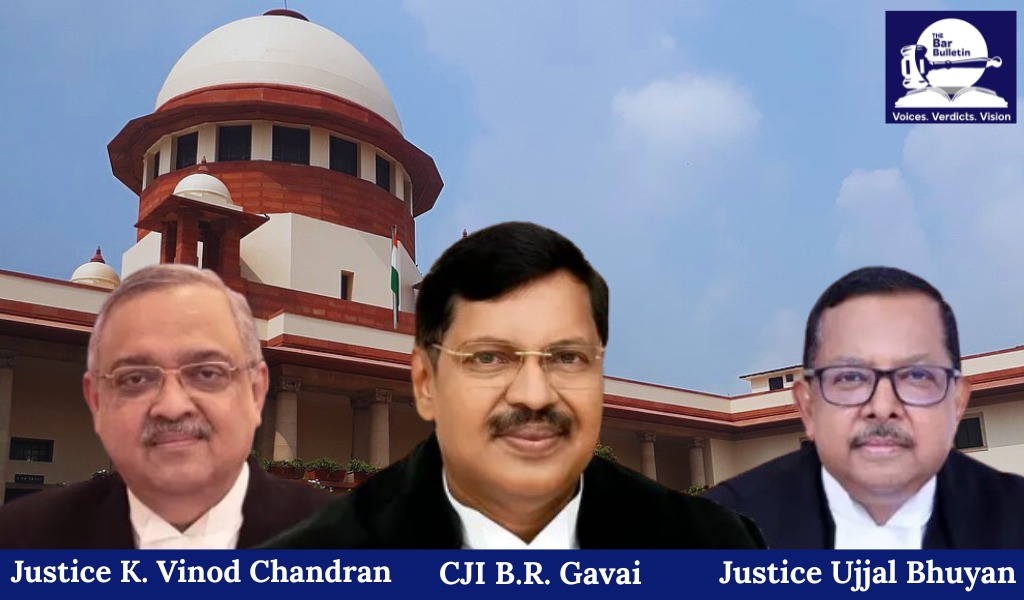The Supreme Court, in a 2:1 majority judgment, recalled its earlier judgment in Vanashakti v. Union of India, 2025 SCC OnLine SC 1139, which had barred post facto or retrospective Environmental Clearances (ECs) to construction projects.
The majority, comprising Chief Justice B.R. Gavai and Justice K. Vinod Chandran, held that the Vanashakti (referred to as JUR) ruling had failed to notice binding precedent and had overlooked crucial portions of earlier decisions. They added that allowing it to stand would trigger economically devastating and publicly harmful consequences, including demolition of completed public projects worth thousands of crores, making its recall necessary.
During the hearing, the bench was informed that numerous major public projects, including a greenfield airport in Karnataka, the 962-bed AIIMS project in Odisha, and important SAIL facilities, had completed all environmental processes, including public hearings and EIAs, but could not be granted EC solely because of JUR. Counsel demonstrated that JUR’s interpretation would require demolition of fully constructed, otherwise lawful projects, only to rebuild them again after obtaining EC afresh.
The review petition argued that JUR had selectively relied on Common Cause v. Union of India and Others, (2017) 9 SCC 499, Alembic Pharmaceuticals Limited v. Rohit Prajapati and Others, (2020) 17 SCC 157 and Electrosteel Limited v. Union of India and Others, (2023) 6 SCC 615, while ignoring the very paragraphs that allow for regularisation with penalties in exceptional cases. They also submitted that the judgments in the cases of D. Swamy v. Karnataka State Pollution Control Board and Others, (2023) 20 SCC 469, and Pahwa Plastics Private Limited and Another v. Dastak NGO and Others, (2023) 12 SCC 774, were not brought to the notice of this Court.
The Court accepted that Alembic and Electrosteel contain detailed discussions on proportionality, economic considerations, and the permissibility of ex-post facto ECs where environmental compliance is achievable, but those parts were never brought to the attention of the JUR bench. Even more critically, two later judgments, D. Swamy and Pahwa Plastics, which upheld the statutory validity of the 2017 Notification and the 2021 SOP and expressly held that the EP Act does not prohibit ex-post facto ECs, were not cited at all.
The Court underscored principles of judicial discipline, noting that a coordinate bench cannot ignore or overrule another coordinate bench; if it disagreed, it should have referred the matter to a larger bench. Failure to consider binding authority, the Court held, rendered JUR unsustainable.
The majority ruling also stressed that judicial decisions cannot produce absurd or economically destructive results, particularly when the projects themselves are lawful, environmentally appraisable and capable of compliance. It noted that environmental law requires proportionality, and the blanket demolition that flowed from JUR directly contradicted that principle.
CJI Gavai emphasised that enforcing Vanashakti would produce irrational and wasteful outcomes, as “demolition of the projects already completed would, rather than being in public interest, result in throwing the valuable public resources in the dustbin.”
Justice K. Vinod Chandran, concurring, echoed this concern and underscored the futility of a rigid approach, observing that “a rigid, pedantic approach first directing demolition and then enabling an application for EC for commencing the very same project would be akin to setting the clock back to save time.”
However, in a strong and uncompromising dissent, Justice Ujjal Bhuyan rejected the very premise of recalling the Vanashakti judgment, holding that “no case for review has been made out” and that the grounds relied upon by the Chief Justice were not at all tenable. He described the new emphasis on economic loss, demolition costs and wastage of public resources as a false narrative of pitting environment against development.
The minority also dismissed Mr Rohatagi’s argument that demolition would create more dust or pollution as ‘against any logic, economic or otherwise,’ noting that such submissions were advanced by violators seeking to justify projects commenced without legally mandated prior environmental clearance.
Justice Bhuyan warned that the majority’s approach marked a troubling departure from settled constitutional principles governing environmental protection. He emphasised that the precautionary principle is the cornerstone of environmental jurisprudence, and criticised the review judgment for giving it a ‘short shrift’ in favour of a relaxed polluter-pays logic. Calling the recall a “step in retrogression,” the dissent stressed that the Court cannot be seen “backtracking on the sound environmental jurisprudence that has evolved… that too, on a review petition filed by persons who have shown scant regard for the rule of law.” Rejecting the reliance on Electrosteel, Pahwa and D. Swamy, he held that they represent a complete U-turn and violate the doctrine of non-regression, reiterating that ecology and development are not adversaries but constitutional partners under sustainable development.
With Justice B.R. Gavai and Justice K. Vinod Chandran forming the majority, the Supreme Court recalled the earlier Vanashakti. Justice Ujjal Bhuyan delivered a firm dissent, insisting that no grounds for review were made out and that recalling the judgment marked a retreat from settled environmental jurisprudence. With the Court delivering a 2:1 split, the earlier Vanashakti ruling now stands recalled.
Apperancences
Shri Tushar Mehta Solicitor General for the Union of India, Shri Kapil Sibal, learned Senior Counsel, Shri Mukul Rohatgi and Shri Kunal Vajani Advocate.

